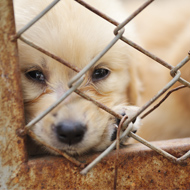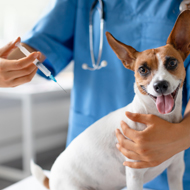
Vast numbers of puppies born to unlicensed breeders
Almost 90 per cent of all puppies born in the UK are born to unlicensed breeders, according to a report published by Battersea Dogs & Cats Home.
Published today, the report on Licensed Dog Breeding in Great Britain exposes a shocking lack of regulation in the UK dog breeding market.
Battersea believes that this lack of regulation could be helping breeders and dealers sell dogs from unsuitable premises well before the puppies are ready to leave their mothers.
Dog breeding enforcement is undertaken by Local Authorities who issue breeding licences to anyone selling puppies commercially, or producing five or more litters per year. Local Authorities also regularly inspect the premises of dog breeders.
The report shows that less than 12 per cent of puppies born in Great Britain every year are bred by licensed breeders, meaning that 88 per cent of puppies bred are born to unlicensed breeders.
It also reveals that over a third of Local Authorities do not have any licensed breeders - with 77 per cent not issuing any licences at all to new breeders in 2014.
Commenting on the figures, Battersea's chief executive, Claire Horton, said: “When you’re getting a new puppy, how can you be sure that you’re getting your dog from a responsible breeder when our own national breeding licence system is in such a mess?
"The gaping holes in enforcement of breeding legislation leave the door wide open for backstreet breeders to own the market and pocket huge profits from overbreeding, without a thought for the welfare of the animals in their care.
“Every day Battersea takes in dogs that have been abandoned by owners who bought them online or from ‘the man down the street’, which have come from unknown breeding premises. We’re seriously concerned that there’s no nationwide overview of dog breeding and no consistency amongst Local Authorities when it comes to this issue.”
The Battersea Breeding report also showed vast discrepancies between different Local Authorities and licence fee structures - with some charging 32 times as much as others for the same service.
Battersea's advice for anyone seeking a puppy is to never buy online.
"Go to a rescue centre or reputable breeder," says Claire. "Always see the puppy with its mum and make sure they're both healthy and the puppy is at least eight weeks old."



 RUMA CA&E has extended the deadline for its online survey into vaccine availability.
RUMA CA&E has extended the deadline for its online survey into vaccine availability.